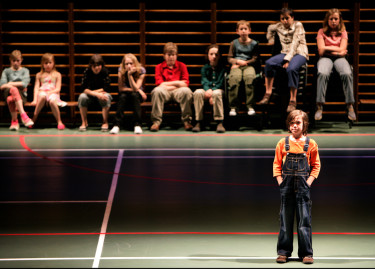Long interview with yours truly by Helmut Ploebst at Corpus (Internet Magazine for Dance, Choreography and Performance). The new issue is themed on the ghosts. We are talking about ghosts, Forced Entertainment’s Spectacular, performance, the economic crash, Ghostdance and all and everything
Meanwhile some talk of That Night Follows Day over at the Guardian Live Blog including what’s below, from me, in response to various strands in the comments. Worth checking the link since both Alexander Devriendt, director of Once And For All (from Gent) and Richard Gregory of Manchester’s Quarantine both weigh in with lengthy comments on their own perspectives on working with young people, the kind of truth or authenticity we can or can’t achieve in performance and so on. Some nice links from Ant Hampton also, to materials on Beunos Aires director Vivi Tellas. Here’s my two penneth:
*
Without getting into too long a thing about process, I can maybe add something here about how That Night Follows Day was made. The piece – which was produced by the Flemish theatre Victoria (Campo) – has a text by me, as noted by Lyn already and as I think anyone who knows my work (or reads the programme) can probably tell. The text was made in two stages – it started with writing by me, to which new material was added, developed, structured and refined in a workshop process with the 16 young people who perform the piece. It certainly wasn’t a case of my arriving with a completed ‘vision’ and a script and dropping it onto the performers – instead, as is the case with more or less anything I’ve ever done with adult performers in Forced Entertainment or elsewhere– this piece grew from, in and around the performers as part of a long long process – a process that involved discussions, suggestions, trying things, changing things, collaborative rewrites in doing you could say.
The whole question of if the performers understand and own what they are doing is a fair one. My experience working with and watching these young people doing the piece over the last two years is – that like a group of adults who have worked together on something – they know what they are doing and they own it very well. They’re acting. They’re finding a position within the piece from which to speak and face the audience. They know what that means. I take the young performers in the making and doing of the piece seriously. They made, regard and play it intelligently. It’s a structure, and they work to make it sing.
That Night Follows Day is about the frames (societal, intellectual, educational, famillial, physical) that adults construct for young people. It’s also, inevitably, an example of these processes. So far as I can work out there can be no interaction possible between adults and young people that escapes this. That’s what the piece is about. You can see my projection in it, and as an audience you can see and feel your own. The children are ‘in’ that – caught and free at the same time – just as they are in the outside world. What’s great I think is that young people are also always exceeding and escaping these frames. They do that in the performance too.
I’m glad to agree that TNFD is not “the authentic voice of young people” – ughhh. I wouldn’t set out to make something so naive. I wouldn’t claim to represent in that way. In any case I hardly believe in authentic voices fullstop, not even my own. Voices are voices – they are complicated layerings of desire, fantasy, limit, projection, haunting, fiction. Authenticity is a particularly contemporary tyranny of sorts, and has become a fetish, sought everywhere, by the media especially and (to be frank) most often quickly devoured as spectacle before the circus moves on. In that sense it doesn’t interest me – I’m interested in making something more complex in fact, and which knows very well that it is artifice, even as something like a truth moves in and out of it. But maybe that’s another discussion. What TNFD tries to make as a performance is an echo box, a space for reflection on how adults make and frame the world for young people. I think, from reactions over from audiences and critics in countries all over Europe over the last 18 months since we opened the piece, that it works pretty well in that respect.
 That Night Follows Day, 2007
That Night Follows Day, 2007